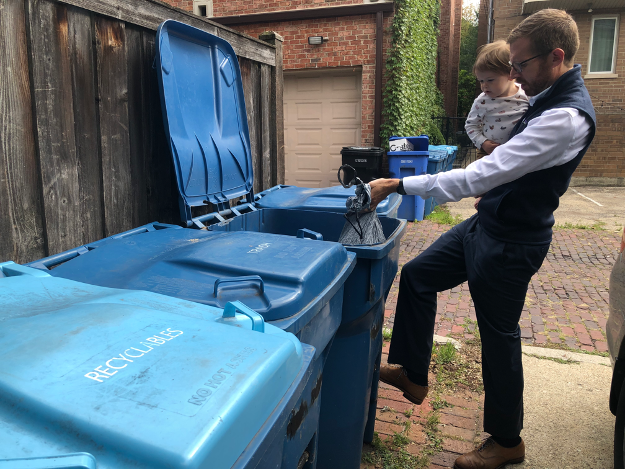C.A.T.S.: Chicago Avoids Trash Surprises.
I do a weird thing when I take out my garbage: I kick the trash can two times.
I do this because two years ago I had a traumatic garbage experience.
I walked into the dark alleyway of our Chicago apartment. Trash in one hand, I opened the lid to the trash – and a giant rat jumped out at me.
I don’t remember much after that, but I believe I threw the garbage at the rat while I screamed and ran back into the house.
It wasn’t my proudest moment.
But this experience doesn’t have to happen too many times to change your behavior. So I learned a new trick: kick the can, the rats get scared before I do and I can dispose of my garbage in peace.
Problem solved, right?
Maybe not.
Teaching my son, Rocky, the lost art of garbage can kicking
It reminds me of a story we discuss a lot in the Paprocki house. It goes like this:
There once was a village on the banks of a river. Everything in the village was peaceful and happy. The people there were good.
But one day, while down by the river, a young girl saw a baby floating in the water.
She dove into the rushing stream, swam out to the baby, brough him back to shore and saved the baby’s life.
The town celebrated this little hero.
The next day, villagers saw two babies floating down the river. They jumped in and saved both of the babies.
The following day there were four babies floating down the river. Then 10. Then 30. The number kept increasing.
Pretty soon, the entire village started setting up 24-hour lookout posts. They had rescue teams. They brought up all these children as new members of the village.
The entire effort of the village was refocused to save these babies’ lives.
While they were able to save most of babies, they couldn’t save them all. There were too many.
Then one day, while sitting on the banks of the river, one of the look-out crew left his post. He ran home.
His neighbors started shouting after him, hurling insults and saying, “Come back here!” and “Coward!” and “You only care about yourself!”
He never responded.
He ran all the way to his house. He said to his wife, “Pack your bags. We’re going up river. We are going to find that son-of-a-gun who is throwing all these babies in the river.”
This story illustrates how I feel as a conservative.
Do we care about the poor? Yes.
Do we care about the marginalized? Of course.
Do we care about the homeless? Absolutely.
But I want to go upriver and solve the underlying problems. I don’t want poverty to be “more tolerable.” I want to eradicate it.
That’s not to say we shouldn’t care about the symptoms- we should. But if we focus all of our attention on the symptoms and don’t fix the causes, we are spending all our time pulling babies from the river.
Villagers just saw the man running away. No one saw his conversation with his wife or understood his heart was in exactly the right place.
So how do they understand his intent or our intent to find a permanent solution?
Easy: We need to tell them.
We need to show people what we care about.
We need to lead by saying, “I believe everyone deserves dignity and respect and we need to fight for the dignity of the poor and marginalized. I believe the American Dream was founded on the principle that all people, through hard work, can achieve greatness. That’s why I support…”
Saying words like this is the difference between being misunderstood and reviled, or creating a movement that brings an entire group charging behind you.
But it’s not easy.
It’s easy to get lost in the symptoms. We all do it.
As my daughter pointed out to me, “Daddy, why don’t you just get rid of the rats instead of kicking the garbage can all the time.”
She’s right. It’s time to go upstream.




